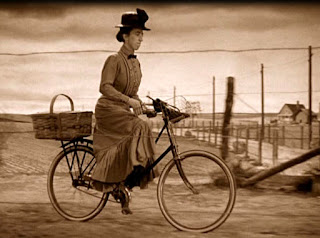I read once (or maybe more than once, but who's counting?) that characters are more likable when they are flawed, and to some extent, I believe this to be true. I have my favorite characters who are all flawed in many ways, but there are those characters who are beginning to pick at that last nerve. They're so cliched and I wonder why they are chosen over and over again as the favored protagonist or one of the main characters. I don't like them any more because I see them everywhere!
The Millionaire Philanderer
I don't understand this. Why is it that the guys who have money must be portrayed as weak when it comes to women in pursuit? Stop letting these women drape on you like a cheap suit! Sling them to the side and show some self-respect. This is similarly done with the rock stars toting around their posse and loyal groupie bangers. And why are they always extremely handsome? Ever see Donald Trump or Hugh Hefner? For real...
The Deep Dark Secret Sufferer
A great way to expose a flaw for a character who has a secret is for them to perform some odd behaviors like visit a secret grave on the 3rd of each month, or something equally odd. Stop giving them permission to be emotionally erratic toward others with no explanation whatsoever only to have
character A tell
character B, "Oh, his mother died in a freak accident back in 2010 and he's never really recovered from it. A year later his sister was ate up by some flesh-eating bacteria she got at summer camp."
Of course, this sort of thing might work in a comedic rendition of some reality shows I watch for pure entertainment.
The Damsel In Distress
I'm tired of distress getting rewarded just because it is the more attractive option to the male ego. What about the woman who refuses to be rescued and this causes a man to leave her side and ultimately results in his saving a bus load of children?
Yea, women understand sacrifice, too. We know other shit is going on out there other than ourselves. Some of us can save ourselves. We can also help save others as well. Go save yourself a puppy or something! Readers will LOVE you. I promise.
The Chip on the Shoulder
This dude needs to get out of his own way. Nobody likes this anymore! The bad guys are losing steam because there are too many of them. You know, the opposite of this flaw is the shy guy. I love me a shy guy, too. Please let's do away with the wise-cracking assholes and invite the John Nash's into our stories, because you can't have enough of
A Beautiful Mind.
The Jealous Woman
Jealousy has always been an ugly thing to me, especially in a woman. If you're going to make your character a jealous one, at least give them some redeeming quality like having them internalize it rather than going all out ninja on a bitch. I guess what I'm saying is that jealousy can make a character vulnerable, therefore likable, just don't let it shine in all its ugliness by having your character act upon her jealousies, because then it becomes completely unlikable.
A "like" plus an "unlike" kind of cancel each other out, so what's the point? Unless you're building a villain, in which case all out ninja would be just fine.
The Pained Drunkard/Addict
Sometimes this is done well and I feel bad for the character. Most times I think the character deserves what's coming to them. I'm unsympathetic to these characters. Yes, even though I drink beer and one might consider me an alcoholic for doing so, I still abhor such characters who cannot rise above their addictions.
I want to sympathize, but at the same time it's hard not to want to punch this character in the face and shout. Come on already! You have to get up and be at the courthouse first thing in the morning, you oaf. Put the vodka away for Christ's sake!
The "I Lost My Entire Family" Victim
I know what it's like to lose a loved one. I lost my father in 1992, my mother in 2006, and my grandmother in 2009. Trust me, putting them all together at the same time doesn't make the pain worse; it makes you more an asshole trying to get a bigger reaction from your reader. How can it be even more painful? Kill the grandmother too!
Trust me tragedy is fine if you do it right. But, if done wrong, the author comes across as trying to make double and triple sure that the reader sympathizes with their character. The character is devastated. He didn't just lose his beloved wife. He lost his daughter, their two dogs, the cat, and their pet goldfish. How could you not feel horrible for this guy?
STOP it!
The Washed Up Hero
This always happens in sequels or starts out the very first scene with the hero, washed up and ready to commit suicide. Don't worry! You'll soon find out why he was so miserable. Hello Mel Gibson,
Lethal Weapon. Loved the movie. Suicidal would be lost in translation in the written form, IMHO.
The visual is a different story though. The tears, red eyes, shaking hand with gun self-directed at his head. Don't do it! Aw, everything will be okay. Whatever it is bothering you, it will work out. It's the beginning of the movie and we have another hour and a half for things to get better. Plus, you're the star of this movie, so you can't die just yet. There, there, put the gun down.
The Arrogant Entrepreneur/Estate Owner
I just read a post today and found out that there is a romance novel "genre" (?) which caters to this situation. I believe it's called Regency Harlequins. I'll research it more and make an addendum here when I have the chance. But honestly, I don't see the draw to such a thing. There's nothing particularly romantic about having to deal with an estate. Been there, done it. It's a huge pain in the ass.
The Stubborn Rebel
The
romance novels I've read years ago were not the same as they are today. The men in those books were men. Pure men. They were arrogant, not stubborn. They were righteous, not rebellious. They were businessmen, doctors, professors, and pilots. The romance was written for a different culture back then.
But, I've tried to read romances these days and I can't. It's too painful. The men are like boys. Stubborn, like when a mother tries to get her son to eat his veggies. Yeah, that kind of rebelliousness is not romantic to me. I want a man in this story, not a two year old. Dammit, I'm dating myself.
Are there character flaws that just don't work for you? Did I point out a character flaw here that you actually like and felt that I didn't do it the justice it deserves? Well, come yell at me about it! Or just leave a polite comment. :)

If you enjoyed this article and would like to receive future articles in your inbox ---
Subscribe to our free newsletter


























